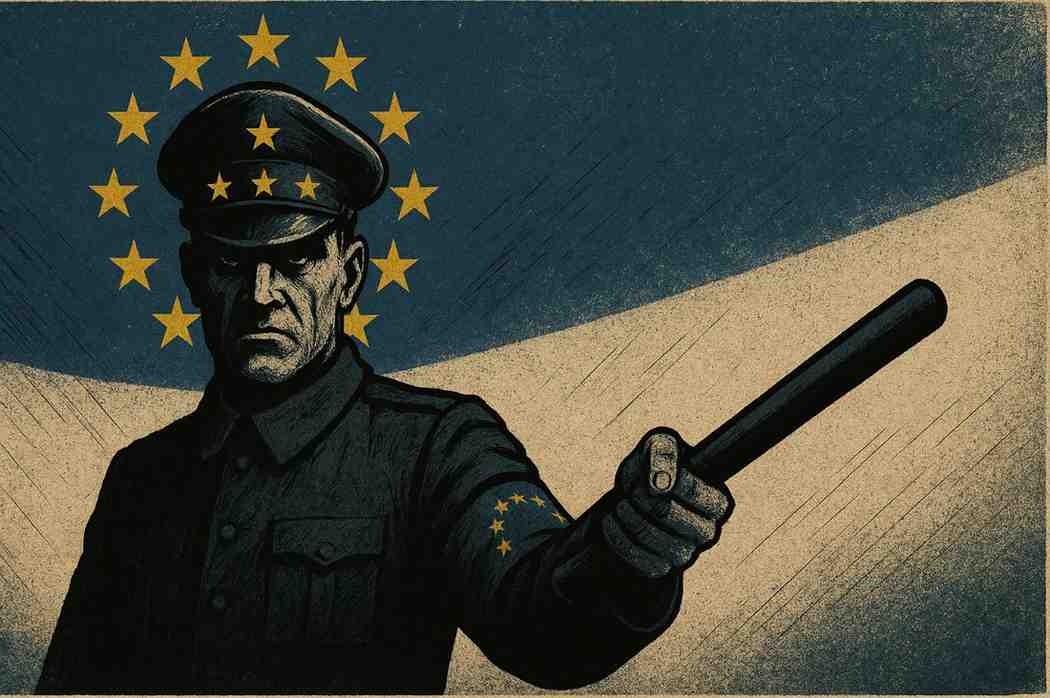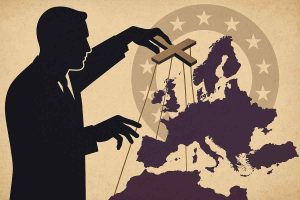The EU’s march toward authoritarianism: Cancelling elections and silencing dissent

The erosion of democracy in the European Union
The European Union, which claims to uphold democracy, human rights, and political freedom, is increasingly behaving like the authoritarian regimes it claims to oppose. Recent developments show a clear pattern: elections are being manipulated or outright canceled, “far-right” candidates are being excluded from political participation, and dissenting voices are silenced through media control and legal repression.
These actions mirror the tactics of communist regimes, where power is centralized, opposition is suppressed, and elections serve as mere formalities rather than genuine democratic processes. Despite presenting itself as a beacon of democracy, the EU is moving toward a system where only approved, pro-EU candidates and policies are permitted.
Cancelling elections: A warning sign of authoritarian rule
The case of Romania: Nullifying democratic votes
One of the most blatant examples of the EU’s anti-democratic tendencies occurred in Romania. In early 2024, the Romanian government, under strong pressure from Brussels, announced it would merge local and European elections, effectively overriding previous votes and reshaping the electoral process to favor pro-EU parties. Officially, this was justified as a way to “streamline” voting, but critics argue it was a deliberate move to prevent nationalist and euroskeptic parties from gaining power (EU pressures Romania to merge elections, Politico).
This type of election manipulation is a hallmark of authoritarian rule. Communist regimes frequently altered electoral laws to maintain their grip on power, ensuring that opposition forces never had a fair chance at governance. By interfering with Romania’s electoral process, the EU demonstrated that its commitment to democracy is conditional—valid only when elections produce results that align with Brussels’ interests.
Spain and Germany: Disqualifying opposition candidates
The EU’s campaign against nationalist movements extends beyond Romania. In both Spain and Germany, nationalist candidates have been disqualified from running for office under dubious legal pretexts. In Germany, the government has taken steps to potentially ban the Alternative for Germany (AfD) party, labeling them as “extremists” despite the fact that they operate legally within the democratic system (German authorities consider banning AfD, Deutsche Welle).
In Spain, right-wing nationalist candidates have been removed from ballots using vague accusations of hate speech and extremism, even in the absence of criminal convictions (Spain moves to ban nationalist candidates, El País). This selective enforcement of political restrictions highlights the EU’s growing authoritarianism. Rather than allowing voters to decide, Brussels and its allied governments ensure that only pro-EU candidates are allowed to compete.
The EU’s ideological control and suppression of dissent
Media censorship and political persecution
A key feature of totalitarian regimes is control over information. The EU has been expanding its ability to suppress dissent through laws like the Digital Services Act (DSA), which gives Brussels the power to fine or shut down online platforms accused of spreading “disinformation” (Digital Services Act: Controlling Online Speech, European Commission). In practice, this means that critical voices, particularly those opposed to EU policies on migration, climate change, and sovereignty, can be silenced at will.
At the same time, independent journalists and political activists who challenge the EU’s narratives face increasing persecution. In Hungary and Poland, independent media outlets critical of the EU have been heavily fined or shut down (EU cracks down on Polish independent media, Reuters). These actions resemble the Soviet Union’s methods of suppressing dissent by labeling opposition media as dangerous or subversive.
Criminalizing opposition under “hate speech” laws
Several EU member states have introduced strict “hate speech” laws that disproportionately target right-wing and nationalist figures. France and Belgium have prosecuted individuals for questioning EU migration policies, while Germany has arrested political activists under broad interpretations of hate speech (Germany’s new hate speech laws target right-wing figures, Der Spiegel).
Notably, these laws are not applied equally. Left-wing activists and politicians who engage in violent protests or make inflammatory statements rarely face legal consequences. This selective enforcement serves one purpose: eliminating political opposition while maintaining the illusion of democratic governance.
The EU’s double standard: Marine Le Pen vs. Christine Lagarde
Targeting Le Pen for political reasons
One of the clearest examples of the EU’s selective justice system is its treatment of Marine Le Pen, the leader of France’s National Rally. Le Pen has been repeatedly targeted by EU institutions and the French government, facing legal investigations and attempts to disqualify her from running for office.
The latest attack on Le Pen involves allegations of financial misconduct related to the use of EU parliamentary funds, despite the fact that many pro-EU politicians have engaged in similar practices without consequences (France targets Le Pen with financial investigation, Le Monde). This politically motivated prosecution is clearly intended to weaken her electoral prospects ahead of upcoming elections.
Christine Lagarde: A convicted criminal protected by the EU
In contrast, Christine Lagarde, the current President of the European Central Bank (ECB), was found guilty of criminal negligence in a financial scandal in 2016. Despite her conviction, she faced no punishment and was allowed to continue in high-profile EU positions (Christine Lagarde guilty of negligence but escapes penalty, BBC News).
Lagarde was responsible for approving a massive state payout to a politically connected businessman while serving as France’s finance minister. Unlike Le Pen, who has been relentlessly pursued over minor financial allegations, Lagarde enjoys full protection from Brussels, highlighting the EU’s double standard: pro-EU officials are above the law, while nationalist politicians are treated as criminals for far lesser infractions.
The road to centralized power: A planned superstate
Undermining national sovereignty
The EU’s authoritarian drift is not limited to election interference and censorship. The long-term goal appears to be the transformation of the EU into a centralized superstate, where member states lose their sovereignty. The recent push to remove veto powers from nations like Hungary and Poland illustrates this ambition (EU plans to strip Hungary of veto rights, The Guardian).
If successful, this move would mean that smaller or dissenting countries could no longer block harmful EU policies. Instead, all decisions would be made by Brussels, regardless of public opinion in individual member states.
Military and economic control
Another crucial aspect of the EU’s power grab is its increasing control over military and economic policy. The European Defence Fund and discussions of an EU army show a move toward a centralized military structure, reducing member states’ ability to control their own defense strategies (EU defence plans: Toward a single army?, Financial Times). Similarly, the push for a digital euro would allow Brussels to monitor and control financial transactions, limiting economic freedom (The digital euro: A tool for control, Bloomberg).
These developments resemble the centralized control mechanisms of communist regimes, where the state dictated all aspects of economic and military policy. The EU is following a similar path, eroding national independence and consolidating power in the hands of unelected officials.
Conclusion: The EU’s authoritarian trajectory
The European Union has abandoned its original purpose as an economic alliance and is transforming into an increasingly authoritarian system. By canceling elections, disqualifying opposition candidates, controlling the media, and using the legal system to target political opponents, the EU is adopting the tactics of communist regimes.
The double standard in how figures like Marine Le Pen and Christine Lagarde are treated exposes the EU’s true priorities: punishing those who challenge Brussels’ power while protecting those who serve its interests.
If these trends continue, the EU will cease to be a democratic entity in any meaningful sense. Instead, it will become an ideological dictatorship, where political dissent is punished, national sovereignty is eroded, and elections are manipulated to maintain the rule of an unelected elite.
The warning signs are clear. The question remains: Will European citizens resist, or will they allow Brussels to consolidate its grip on power unchecked?


















